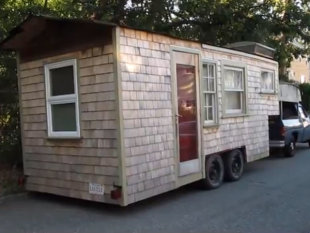Home Remodeling Repair & Improve Ideas & Solutions Radio & Podcasts Contact Us Community
Listen 24/7
Presented by:






Home improvement spending is booming! A recent study found that home-related goods took priority over back-to-school shopping online this summer, and stores are also seeing their highest sales in years. If you, like millions of other homeowners, are ready to start taking on projects you've been putting off -- choose projects that pay off. You can do-it-yourself, but you don't have to do-it-alone.
The Welcome Mat
This Issue

How to Buy a Pressure Washer
Pressure washers have the power to really clean the dirt and grime that can build up on your home over time. Pressure washers are also a good tool for cleaning a variety of items in and around the home such as cars, boats, patio furniture, decks and sidewalks. If you are considering buying a pressure washer, here's a tip to help you understand the options. read more

VIDEO: Picking the Right Tile Cutter for the Job
Get a good overview of different methods and tools for tile cutting. Learn which would be the best for specific types of tile and projects, such as backsplashes, fireplaces and bathroom floors. Whether you are working with 4-inch or 12-inch tile, and whether you need to make straight cuts or bevel cuts, this video will introduce you to the right tool for you. read more

Wood vs. Vinyl: Choosing the Best Material for Your Windows
When you're selecting windows, material is every bit as important as design. Wood and vinyl each offer great benefits for your final window selection, and with Andersen 400 Series windows, you get the best of both materials. Click through for tips on choosing a window that matches your budget, maintenance and design needs. read more

Driveway Sealing and Repair: Easy Tips for Great Results
Asphalt driveways take a beating from Mother Nature. UV rays, moisture and freeze-thaw cycles cause cracks, exposing the aggregate and deteriorating the binders that hold your driveway together. That's why it's important to repair driveway cracks or potholes and apply driveway sealer on a regular basis to protect it. read more

ON THE AIR: Rot and Insect-Resistant Trim
Learn about trim for your home that is beautiful but needs no maintenance. Learn how to care for your bathroom fan and your ceiling fan. Plus get answers to your home improvement questions about bathroom venting, shower mold, caulking, patio floors, and more. read more
Share This Information With A Friend!
Simply forward this Email. And invite friends to register to receive this E-newsletter each week. If you would like to unsubscribe from our weekly newsletter, please refer to the unsubscribe directions at the bottom of this newsletter.





Friday, September 28, 2012
Home Repairs that Pay Off - 9/28 Money Pit e-Newsletter
MacGyver-Inspired Hacks by Top DIY Guys
check out our household hacks.
View in: browser or mobile | Forward to a friend
Quick Links 
Sign In 
Join Now 
HouseLogic Blog 
Why HouseLogic?
Hello

This week we're celebrating the 27th anniversary of MacGyver with household and garden hacks inspired by our favorite secret agent. Tips include:
• A surprising remedy for clogged drains • An office supply doubles your pantry space • Plus, an unexpected use for leftover coffee
All of our MacGyver-like hacks come from our favorite DIY home and garden experts.
Forward to a Friend Find us on Facebook Follow us on Twitter
ADVERTISEMENTTo ensure that you continue to receive email from HouseLogic.com,
please add Newsletters@mail.houselogic.com to your email address book.To change your email address or view your contact preferences, please sign in and go to Your Profile.To unsubscribe from future e-newsletters, tips, and more from HouseLogic, please click here.For more information, please see our Privacy Policy.NATIONAL ASSOCIATION OF REALTORS®
430 N. Michigan Avenue
Chicago, IL 60611
800.874.6500
www.HouseLogic.com
© Copyright 2012 NATIONAL ASSOCIATION OF REALTORS®
Wednesday, September 26, 2012
Quote of the Week
Life is like a game of cards. The hand that is dealt you represents determinism; the way you play it is free will.
Jawaharal Nehru
Jawaharal Nehru
Sunday, September 23, 2012
James Bond Hotel Suite
By Elizabeth Gerst | CNBC – Thu, Sep 20, 2012 7:47 PM EDT
 (Photo: Photo: Seven Hotel)
(Photo: Photo: Seven Hotel)For some well-heeled travelers, Pratesi linens and Carrara marble are what defines a luxury stay. But an increasing number of haute hotels now offer something beyond mere refinement: themed suites that promise both shut-eye and eye-popping escapism.“People are searching for that ‘wow’ factor,” says Nancy Novogrod, editor-in-chief of Travel + Leisure. “These are people who have seen a lot, and they want something to surprise and delight them – to experience a break from the everyday.” With that in mind, we combed the globe to find whimsical, way-out rooms that are truly transporting. Click ahead to see 10 high-end fantasy hotel suites.007 Suite
Location: Hotel Le Seven, Paris
Cost: From $550 per night James Bond fans will be both shaken and stirred by this homage to the sly spy. The den-like, retro retreat features its own Turkish bath, a complete library of Bond films, and, of course, some ultra-cool gadgets, including a TV screen that diffuses four different “mood fragrances” and a lamp with a base made of a (fake) golden gun. Femme fatale not included.
Could You Live in a 120-Square-Foot House?
 Sage Radachowsky's 120-square foot house. (Photo: gypsyliving.org)When Kerri Fivecoat-Campbell and her husband moved from Kansas City to a 480-square-foot lake house in Northwest, Ark., they'd planned to build a larger house on the same property and use the existing house as an office and guesthouse.
Sage Radachowsky's 120-square foot house. (Photo: gypsyliving.org)When Kerri Fivecoat-Campbell and her husband moved from Kansas City to a 480-square-foot lake house in Northwest, Ark., they'd planned to build a larger house on the same property and use the existing house as an office and guesthouse.Yet the recession convinced the couple to stick with the house they had and build another small space as an office and guesthouse. Fivecoat-Campbell says they're happy with a smaller footprint. "We live in an area where recreation is a big thing," she adds. "We like to be outdoors and spend time with the dogs and not have to maintain a big house. It's easier to take care of."
The constant upkeep and high expense of McMansions have made smaller homes appealing to many Americans. "People realize now if they live in a tiny house, they have more money left over to pay for other things," says Derek Diedricksen, a maker of small houses in Stoughton, Mass., and author of Humble Homes, Simple Shacks, Cozy Cottages, Ramshackle Retreats, Funky Forts: And Whatever the Heck Else We Could Squeeze in Here.
Costs for tiny homes can vary depending on factors like the materials and complexity of the design. "There are people who've gone out and built a modest house for $5,000 to $10,000 using Craigslist or free materials, but there are some that are more high-end, like rustic cabins," says Diedricksen.
Margaret Webster, who moved into a 12 x 16 foot house on Echo Valley Farm outside Ontario, Wisc., a few years ago, says she paid close to $40,000 for the house, which includes solar panels, a wood stove, a wind turbine, and a water tank. "It costs more now," adds the retiree.
 Radachowsky's bed. (Photo: gypsyliving.org)Some tiny house-dwellers who DIY their homes wind up paying much less. Sage Radachowsky, who lives in Boston in a 120-square foot house he built atop a car trailer, says the materials for his house cost around $3,000. (He rents a driveway to park it, but says the driveway costs less than a typical small room in Boston.)
Radachowsky's bed. (Photo: gypsyliving.org)Some tiny house-dwellers who DIY their homes wind up paying much less. Sage Radachowsky, who lives in Boston in a 120-square foot house he built atop a car trailer, says the materials for his house cost around $3,000. (He rents a driveway to park it, but says the driveway costs less than a typical small room in Boston.)Here's a look at why these tiny home-dwellers chose to downsize and how they made the transition:
Low (or no) mortgage. Webster and Radachowsky have no mortgage on their homes, which can be freeing both financially and personally. "My life is less expensive, which gives me more time to enjoy it," says Radachowsky, who goes hiking, writes songs, build guitars, and grows food in a small garden.
Fivecoat-Campbell took out a mortgage, but she says it might be preferable to go mortgage-free on a smaller home. Back when she and her husband owned two homes, they were on a balloon payment for the lake house and worried that an interest rate hike might price them out of the house. They spent eight months searching for a bank that would allow them to refinance. "[Companies] couldn't find anything comparable to the house," she says. "There are small houses and trailers but nothing like our house. That's where we ran into trouble refinancing, but we did find a local bank that would refinance us."
Lower utility costs. Tiny house-dwellers have several options for utilities. If building codes allow it, Diedrickson says they can install electricity and plumbing as they would in a regular house, but that's generally more expensive than going off the grid. "The majority of the world still uses outhouses," he points out. "There are different toilets on the market, like composting toilets, that in essence turn your waste into ash or usable compost, so you can bypass having to have a septic system at all."
Tiny house-dwellers who are eco-conscious appreciate not just the lower utility costs but the smaller environmental impact. Radachowsky harvests electricity from a solar panel and says he pays around $20 a month for propane to heat the house during the coldest months. Webster, meanwhile, has no connections to public utilities except for a telephone (so she can stay in touch with family). She uses a composting toilet and washes in a bucket. "I grew up washing in a bucket," she explains, "but sometimes I wash my hair next door because it's easier."
Still, utilities for tiny houses can create complications. Fivecoat-Campbell opted to dig a well, which "went deeper than we'd ever imagined," running up the cost since the company charged by the foot. However, she's happy with the lower cooling costs in the summer.
Less clutter. A smaller living space pushes the homeowners to cut down on their possessions, but that means they have fewer belongings to maintain and spend less time searching for lost items. "It's amazing, we just don't need all that room or that much stuff," says Webster, who's previously lived on a sailboat and says her next project is converting a car to electric.
Initially, Radachowsky stored some of his belongings in a basement. "I'm still winnowing my belongings down, but that is a liberating process," he says.
Unlike a McMansion with endless rooms to fill, a small house acts as a deterrent for buying more stuff. "In a small house, everything has to be functional," says Fivecoat-Campbell, who videotaped some of her belongings, such as her mother's dining room set and an antique spinning wheel, before cleaning house. "I'll always have the memories, I just won't have to store the stuff," she says.
Diedricksen points out that tiny houses aren't new, but they make a lot of sense financially: "Growing up, most of my friends' parents were never around to enjoy their big houses because they were working to pay for them."
Subscribe to:
Posts (Atom)








